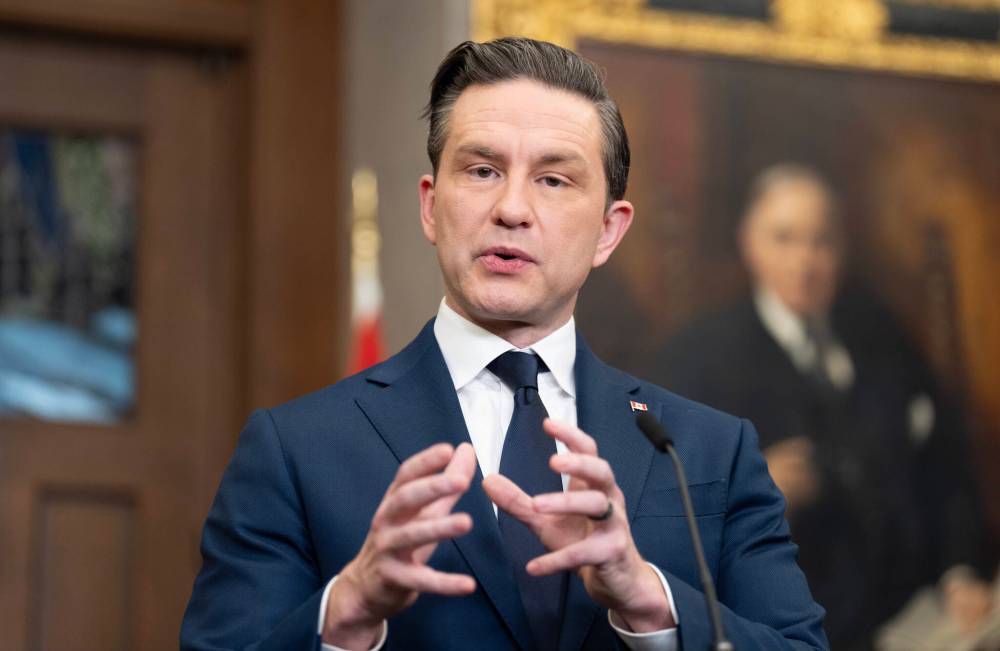Not welcome on voyage: Poilievre and the media
Advertisement
Read this article for free:
or
Already have an account? Log in here »
To continue reading, please subscribe:
Monthly Digital Subscription
$0 for the first 4 weeks*
- Enjoy unlimited reading on winnipegfreepress.com
- Read the E-Edition, our digital replica newspaper
- Access News Break, our award-winning app
- Play interactive puzzles
*No charge for 4 weeks then price increases to the regular rate of $19.95 plus GST every four weeks. Offer available to new and qualified returning subscribers only. Cancel any time.
Monthly Digital Subscription
$4.99/week*
- Enjoy unlimited reading on winnipegfreepress.com
- Read the E-Edition, our digital replica newspaper
- Access News Break, our award-winning app
- Play interactive puzzles
*Billed as $19.95 plus GST every four weeks. Cancel any time.
To continue reading, please subscribe:
Add Free Press access to your Brandon Sun subscription for only an additional
$1 for the first 4 weeks*
*Your next subscription payment will increase by $1.00 and you will be charged $16.99 plus GST for four weeks. After four weeks, your payment will increase to $23.99 plus GST every four weeks.
Read unlimited articles for free today:
or
Already have an account? Log in here »
Hey there, time traveller!
This article was published 20/03/2025 (296 days ago), so information in it may no longer be current.
It is a little bit of a head-scratcher. During a federal election, when you want as many people as possible to hear your plans and policies, Pierre Poilievre’s Conservatives are kicking the media off of their campaign buses and aircraft.
One of the reasons the CPC cited? The increased costs of travel — and travel is certainly more expensive.
The only problem with that explanation is that the media doesn’t take gifts from political parties, including travel — media outlets are billed for their travel costs by the CPC.

FILE
Federal Opposition Leader Pierre Poilievre
Still, the CPC says improvements in digital technology mean Poilievre will be open and available, with the party telling media well in advance where Poilievre will be going, and providing digital access to the leader.
“We would like to assure you that this campaign will be one of the most accessible and transparent campaigns in recent memory. We have taken multiple steps to ensure that Canadian media will be able to share any public events, participate in events on the ground, and ask questions remotely and in-person,” Conservative Party national campaign director Jenni Byrne said in a memo to media organizations.
But why take away media access that will serve to increase your candidate’s public presence?
There are a couple of possible reasons. One may be that Poilievre wants to have less-experienced media covering his campaign positions, so that those positions aren’t as rigorously challenged. The other is that his handlers are afraid that he can’t handle the regular parliamentary press corps without lashing out.
After all, the party already has strictly controlled news conferences, limiting the number of questions Poilievre will answer — and who the party will allow to ask them. In one recent news conference, he limited questions to five outlets: True North, Rebel News, Y Media SouthAsianDaily, Oxygen Canada News and Radio-Canada. Only Radio-Canada, the French-language service of the CBC, could be considered mainstream media.
It is also, sadly, similar to a page out of the Trump handbook. Donald Trump has been removing experienced media from handling the presidential media pool in favour of “friendly” outlets, claiming a need to better represent digital media. Which is why a reporter from Real America’s Voice network asked the first question of Ukrainian President Volodymyr Zelenskyy at a high-tension White House meeting — a question about why Zelenskyy wasn’t wearing a suit. The question gave Vice-President JD Vance the perfect opening to lambaste Zelenskyy for not offering up enough performative gratitude to the United States for weapons and other support. The Associated Press, the largest wire service in the U.S., wasn’t even allowed in the room.
It’s true that Conservatives aren’t alone in having fractious relationships with the press: Prime Minister Mark Carney had his own run-in with the CBC’s Rosemary Barton in the few days there have been since he became prime minister, and attacking the credibility and motives of the media has become normal political process.
But there’s a difference between occasional run-ins between political leaders and the media, and a party leader who makes no effort to hide the disdain he has for reporters.
The only question now is whether the move will get Poilievre and the Conservative Party the kind of coverage they want during a federal election campaign, or whether the move will simply and necessarily make coverage of his campaign more difficult — in the process, perhaps limiting Poilievre’s ability to get his message out broadly to the electorate.
If you can’t stand the heat, you can throw the cooks out of the kitchen. But don’t count on dinner to work out perfectly.



